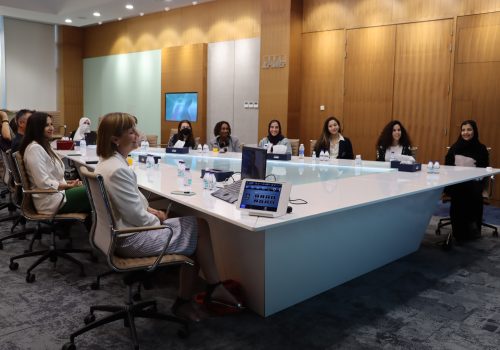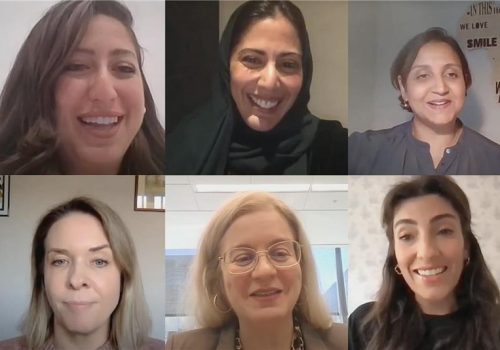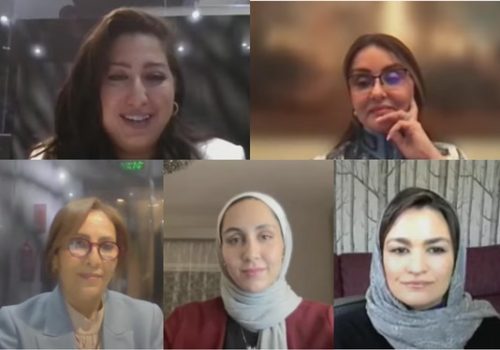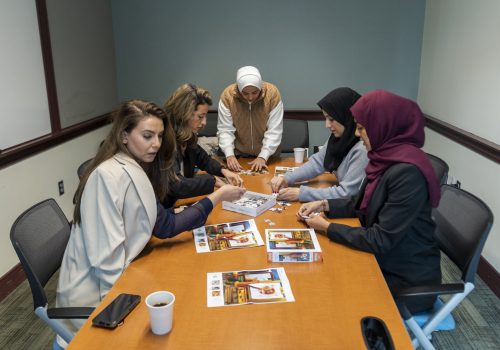WIn Fellowship Roadshow Recap: a promising start for the inaugural fellows
The WIn (Women Innovators) Fellowship, led by the Atlantic Council’s empowerME Initiative recently held a roadshow for its first cohort of Saudi women entrepreneurs. The February 26th to March 3rd 2023 Roadshow marked the culmination of a year-long fellowship aimed at helping entrepreneurs improve their leadership skills and scale their start-ups.
The roadshow included five outstanding Saudi women entrepreneurs:
- Meyce Alauddin, Founder and CEO, The Giveaway Co,
- Dr. Rawan Al-Kharboosh, Founder and CEO, AtPoint tx
- Renad Al-Jefri, CEO, Ad Astra
- Sumayah Alzamil, Co-Founder and CEO, Nugttah
- Sara Binladen, CTO, Quantum
The WIn (Women Innovators) Fellowship was launched by the empowerME initiative of the Rafik Hariri Center and Middle East Programs in March 2022 to support women entrepreneurs in building leadership and executive capacity and scaling their startups to new heights. The goals of the fellowship are to (1) accelerate the leadership and executive skills of women entrepreneurs and provide them with an unparalleled network of mentors, business executives, and policymakers, (2) expose US policymakers, scholars, and the business community to a unique and direct perspective on women’s opportunities and challenges in the select countries, and (3) develop a top-tier network of WIn fellows across the Middle East region who can support one another and be ambassadors for women’s economic participation. The unique collaboration between the Atlantic Council and Georgetown University delivers a year-long program that includes a tailored executive education program by Georgetown University, mentoring, and networking opportunities with leading US and MENA experts and business executives, and workshops with leading experts to advance government and business policies that increase women’s economic participation. The program includes a fully sponsored trip to the United States for selected participants for leadership training at Georgetown and meetings with US businesses and government leaders.
The inaugural program was launched in Saudi Arabia with support from US Embassy in Riyadh, PepsiCo, and UPS as well as the American Chamber of Commerce Saudi Arabia’s Women in Business Committee, which served as the in-person event partner. The inaugural program included thirty Saudi women entrepreneurs and thirty five mentors from companies including Careem, Mastercard, Pepsi, Majid El Futtaim, Mumzworld, and Boeing, among others.
Meetings with U.S. Officials and Businesses Leaders in Washington, DC
The US trip for the five selected fellows includes numerous opportunities for them to learn new skills to grow their businesses. Their week began at Georgetown University McDonough School of Business in Washington DC attending Entrepreneurial Leadership courses where they connected with professors, venture capitalists, and other entrepreneurs.
After two intensive days, the fellows met with representatives from various US government agencies, think-tanks, corporate stakeholders, and other supporters of women’s entrepreneurship programs.
The five entrepreneurs visited the US Department of Commerce where they notably met with Camille Richardson, the Deputy Assistant Secretary for the Middle East and Africa at the International Trade Administration to exchange ideas and discuss potential collaborations. Then they headed to the US Department of State where they met with US government officials. Their discussions with these representatives focused on the conditions of women entrepreneurs in Saudi Arabia and how they could contribute to the country’s economy.
Then they met with senior executives from UPS, one of the program sponsors, for a private luncheon that included Saudi and US government officials. During this meeting, they discussed import-export conditions in Saudi Arabia and ways they could support women entrepreneurs. UPS also invited female entrepreneurs from Mexico to the gathering, which was a great opportunity for the fellows to compare notes, share details about their businesses, and explore ways of collaborating and supporting each other.
That evening, the fellows attended a dinner hosted by The National US Arab Chamber of Commerce which was attended by Saudi and US government officials, business executives, and several former US Ambassadors to Middle Eastern countries. During the dinner, the fellows had the opportunity to hear inspiring stories from the assembled business leaders.
Saudi Arabia’s New Economic Force: Women Entrepreneurs
On March 2nd, the Atlantic Council held a graduation ceremony for the five Fellows at its Washington, DC headquarters. The ceremony included several speakers from the US government, the Saudi government, and Georgetown University. The speakers affirmed the important role women in Saudi Arabia play in advancing the economy and in destigmatizing the perception of female entrepreneurship in the region.
During the graduation ceremony, the WIn Fellows shared inspiring stories about their journeys as female entrepreneurs, including how they overcame challenges and how their businesses are impacting their communities. They also highlighted the tremendous potential for women in the Middle East and North Africa and the critical role Saudi women are playing in developing new sectors in their country.
PepsiCo later hosted a dinner for the graduates where they discussed the business environment in Saudi Arabia and which included US and Saudi officials.
Last Stop: New York City
The final stop for the Fellows was New York City, where ABANA and MasterCard hosted a private lunch with the WIn fellows with senior finance and business. They then attended a meeting at Goldman Sachs headquarters with several of the firms leading women executives. They also met with the leaders of several programs supporting underrepresented founders and small-and-medium-sized businesses including 10,000 women, 10,000 Small Businesses, and Launch with GS.
Future Perspectives
Female entrepreneurs in the Middle East have made remarkable strides in recent years despite many socio-economic and cultural obstacles. They continue to drive innovation and economic growth. For instance, in the region, women lead a greater proportion of tech companies compared to Silicon Valley, with one out of every three companies having a female leader.
Their potential is significant, yet it remains underutilized due to several legal, financial, and social barriers. Supporting and promoting entrepreneurship among women can create more job opportunities, boost economies, and help reduce poverty. For instance, it is estimated that the MENA region is losing about $575 billion annually due to the legal and social obstacles women encounter when attempting to pursue economic opportunities.
Increasing female entrepreneurship leads to more inclusive, prosperous, and equal societies. To fully leverage the economic and social benefits of increased female entrepreneurship, policymakers must take steps to establish an enabling environment for them to prosper and grow. Programs like the WIn Fellowship are essential to help female entrepreneurs in the region overcome barriers to their success. As one of the Fellows, Meyce Alauddin of The Giveaway Co, said: “The fellowship helped and empowered me by giving me personal, entrepreneurship, and leadership tools that I didn’t have before.”
Amira Attia was a Program Assistant with the Atlantic Council’s empowerME Initiative at the Rafik Hariri Center for the Middle East.
Lynn Monzer is the Associate Director with the Atlantic Council’s empowerME initiative at the Rafik Hariri Center for the Middle East.
Related content

empowerME at the Atlantic Council’s Rafik Hariri Center for the Middle East is shaping solutions to empower entrepreneurs, women, and youth and building coalitions of public and private partnerships to drive regional economic integration, prosperity, and job creation.






Follow the conversation on social media using #ACempowerME